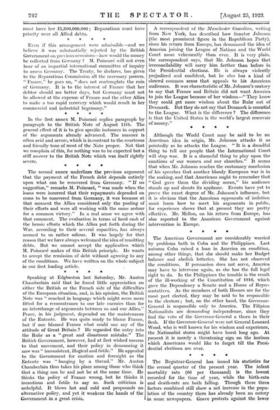Speaking at Edgbaston last Saturday, Mr. Austen Chamberlain said that
he found little appreciation on either the British or the French side of the difficulties of the European situation, and, in his opinion, the British Note was "couched in language which might seem more fitted for a remonstrance to our late enemies than for an interchange of arguments between us and our Allies." Peace, in his judgment, depended on the maintenance of the Entente. He was quite ready to blame France, but if one blamed France what could one say of the attitude of Great Britain ? He regarded the entry into the Ruhr as a "great and disastrous mistake." The British Government, however, had at first wished success to that movement, and their policy in denouncing it now was" inconsistent, illogical and futile." He appealed to the Government for caution and foresight as the Entente was "hanging by a thread." Mr. Austen Chamberlain thus takes his place among those who think that a thing can be and not be at the same time. He thinks the policy of France wrong, but he thinks it incautious and futile to say so. Such criticism is unhelpful. It blows hot and cold and propounds no -alternative policy, and yet it weakens the hands of the Government in a great Crisis.


































 Previous page
Previous page